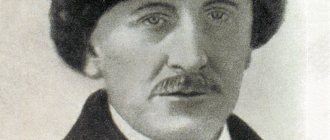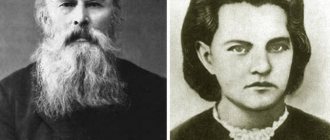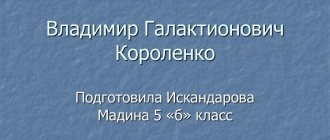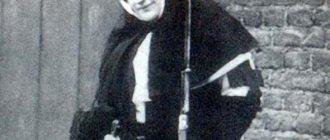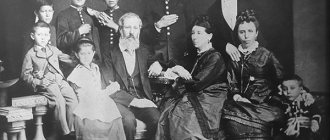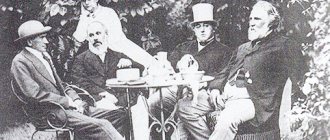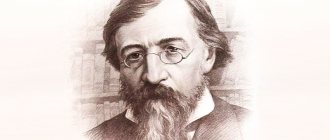- Encyclopedia
- People
- Writer Boris Ekimov. Life and art
Boris Petrovich Ekimov (born in 1938) belongs to the famous galaxy of Russian prose writers, as well as publicists.
Ekimov is a native of the Krasnoyarsk Territory and was born into a family of ordinary Soviet employees. After the end of the Great Patriotic War, Ekimov’s family settled in the Volgograd region, in a small town called Kalach-on-Don, where the future writer received his primary education at a city school, and then became a student at the Stalingrad Mechanical Institute.
After receiving higher education and serving in the army, Ekimov tries his hand at various fields, working as a factory electrician, a fitter, a builder, a teacher of labor education in a village school, and at the same time engaging in his own creativity, with which he makes his debut at the age of 27 in the form of a story , published in the publication “Young Guard”.
The writer’s first full-fledged work was the book “The Girl in the Red Coat,” which immediately gained popularity and gave fame to the author.
Before Ekimov entered the Higher Literary Courses, the writer published several more worthy works in the form of short stories and novellas, including “Night of Healing,” “Officer,” and “The Last Hut,” after the publication of which Ekimov became a member of the Writers’ Union.
The writer’s creative biography includes more than two hundred prose works published in various Soviet and Russian publications, and the most outstanding include the story “The Shepherd’s Star,” which is currently part of the presidential library, as well as the novel “Parental Home” and the story “For Warm Bread.” " In addition, a collection is being published from Ekimov’s pen, in which the writer publishes the songs of the Don Cossacks he collected.
Many of Ekimov’s books have received various state awards and prizes, including Solzhenitsyn’s and Patriarch’s, and are also translated into different languages of the world. According to many writers, Ekimov is a representative of that part of Russian literature that sincerely and truthfully depicts the literary traditions and customs inherent in the Don region, since the writer’s language is devoid of any borrowings and the use of dialectisms, but is expressed in the form of pure Russian speech.
A distinctive feature of Ekimov’s literary work is the theme of his books, which tell about the destinies of ordinary Russian people experiencing various life difficulties and vicissitudes, but at the same time maintaining indestructible dignity, courage, and fortitude. Ekimov’s most striking works of the last period of his creative biography are the books “Don’t Cry”, “Greetings from Afar”, a novel in two parts “Farewell to the Collective Farm”, as well as a collection of short stories called “Healing Stories”.
Currently, the writer is at the venerable age of eighty and lives in his native Kalach-on-Don, continuing to engage in creative activity.
Ekimov, Boris Petrovich
Boris Ekimov was born in the city of Igarka, Krasnoyarsk Territory, into a family of employees. Served in the army[1]. He worked as a turner, a mechanic, a service technician, an electrician at a factory, a builder in the Tyumen region and in Kazakhstan, and a labor teacher in a rural school.
He made his debut as a prose writer in 1965. In 1976 he was admitted to the Union of Writers of Russia, and in 1979 he graduated from the Higher Literary Courses.
During his many years of writing, Boris Ekimov created more than 200 works. Published in the most popular literary publications: “Our Contemporary”, “Znamya”, “New World”, “Niva Tsaritsynskaya”, “Russia”. The most noticeable interest among the readership was caused by the publications of B. Ekimov in the “perestroika” years at the peak of the circulation of “thick publications”: collections of stories “For Warm Bread”, “Night of Healing”, the novel “Parental House”, the story/short story “The Shepherd Star” .
Boris Ekimov is often called “the conductor of the literary traditions of the Don region.”
Dmitry Shevarov, columnist for the Trud newspaper: “Anyone who has read at least one of Ekimov’s stories probably remembers the writer. And although all his heroes are residents of Zadonsk farms, everyone will say: this is about us, about me. About our life - alarming, broken into fragments. With the power of talent and love, the writer carefully collects these fragments into a narrative, which, I think, will remain in Russian literature for a long time as an honest testimony to everything that we have experienced in the last 20 years.”
The works of Boris Ekimov have been translated into English, Spanish, Italian, German, French and other languages. His story “The Shepherd’s Star” is included in the presidential library - a series of books of outstanding works by Russian authors.
Boris Ekimov is a member of the boards of the Writers' Union of the RSFSR (from 1985 to 1991) and the Writers' Union of Russia (since 1994). He was a member of the editorial board of the weekly Literary Russia (since 1987). Member of the editorial boards of the magazines "Father's Land" and "Roman-Gazeta" (since 1998). Member of the State Prizes Commission under the President of the Russian Federation (since 1997). Member of the jury for the Booker Prize (1997).
Boris Ekimov lives, as he often says, “in two houses”: in Volgograd and Kalach-on-Don. He is an honorary citizen of the city of Kalach-on-Don[2].
In 2008 he was awarded the Solzhenitsyn Prize, on the occasion of which Alexander Solzhenitsyn himself wrote:
In many vivid stories and essays, Ekimov depicts the unfamiliar environment of today's rural areas with its new way of life, alluring opportunities and steep threats. This living stream of Ekimov’s paintings, expanding our ideas about the difficult life of today’s village, helps restore, at least mentally, the unity of the national body[3].
Awards
- Winner of the “Our Contemporary” magazine award (1976)
- Winner of the Literary Newspaper Prize (1987)
- Winner of the award named after. I. A. Bunina (1994)
- Winner of the New World magazine award (1996)
- Winner of the first Moscow-Penne Prize (1997)
- Laureate of the State Prize of the Russian Federation (1997)
- Laureate of the All-Russian Literary Prize "Stalingrad" (1999)
- Laureate of the Alexander Solzhenitsyn Prize (2008) - “ for the poignancy and pain in describing the lost state of the Russian province and reflecting the ineradicable dignity of a modest man;
for the source of living folk language that flows in the writer’s prose " - Winner of the Yasnaya Polyana Prize (2014)
- Laureate of the Patriarchal Literary Prize (2016)[4]
Bibliography
| This section is not completed. You will help the project by correcting and expanding it. |
- The girl in the red coat: Stories. - M.: Sovremennik, 1974. - 176 p.
- Among our own: Stories. - Volgograd: Nizhne-Volzhskoe book publishing house, 1975. - 128 p.
- Short Time of the Bearded: A Tale. - Volgograd: Nizhne-Volzhskoe book publishing house, 1977. - 176 p.
- Officer: Stories. - Volgograd: Nizhne-Volzhskoe book publishing house, 1978. - 192 p.
- The Last Hut: Stories. - M.: Sovremennik, 1980. - 270 p.
- Arrived safely: Stories. - Volgograd: Nizhne-Volzhskoe book publishing house, 1980. - 286 p.
- Christmas tree for mother: Stories. - M.: Soviet Russia, 1984. - 302 p.
- Kholushino Compound: Stories and Tale. - M.: Soviet writer, 1984. - 360 p.
- Private investigation: A story. Stories. - Volgograd: Nizhne-Volzhskoe book publishing house, 1985. - 384 p.
- For warm bread: Stories. - M.: Sovremennik, 1986. - 396, [2] p.
- Night of Healing: Stories, story. - M.: Soviet writer, 1986. - 366, [2] p.
- Living Soul: Stories. - M.: Children's literature, 1987. - 189, [2] p.
- The meeting will not take place: Stories. - Volgograd: Nizhne-Volzhskoe book publishing house, 1988. - 269, [1] p.
- Parental home: Roman. - M.: Sovremennik, 1988. - 270, [1] p.
- Solonich: Stories and stories - M.: Children's literature, 1989. - 205, [2] p.
- Shepherd's Star; Trip to the south; “The night passes...”; For warm bread: Stories // Roman-newspaper. - 1989. - No. 24.
- Denunciation: Novels and stories. - M.: Sovremennik, 1990. - 428 p. ISBN 5-270-00723-1
- Stories; Private investigation: A story. - M.: Fiction, 1991. - 413, [2] p. ISBN 5-280-01638-1
- The highest measure: Novels and stories. — Volgograd: Volgogr. com. by press, 1995. - 415, [1] p. ISBN 5-7605-0086-4
- Favorites: [Tales and stories]. - In 2 volumes - Volgograd: Com. on press and information, 1998. T. 1. - 606 p. T. 2. - 623 p.
- Pinochet: Novels and stories. - M.: Vagrius, 2000. - 410, [2] p. — ISBN 5-264-00435-8
- The night passes: [stories, stories] - M.: Resurrection, 2002. - 598, [1] p. — ISBN 5-88528-289-7
- Under the high cross: stories. - Volgograd: Publisher, 2008. - 605, [1] p. . — ISBN 5-9233-0672-7
- No need to cry...: [collection of stories and stories] - M.: Vagrius, 2008. - 396, [3] p. — ISBN 978-5-9697-0595-1
- On the farm: storytelling in stories. — M.: Vremya, 2009/2010. — 463 pp. — ISBN 978-5-9691-0420-4
- Farewell to the collective farm: essays from different years. — M.: Vremya, 2009/2010. — 511 p. — ISBN 978-5-9691-0420-4
- The day will wake up: stories. - Volgograd: Publisher, 2013. - 414, [1] p. — ISBN 978-5-9233-1008-5
- Autumn in Zadonye. A story about land and people. - M.: Nikea, 2021. - 400 p. — ISBN 978-5-91761-322-2
Awards[ | ]
- Winner of the “Our Contemporary” magazine award (1976)
- Winner of the Literary Newspaper Prize (1987)
- Winner of the award named after. I. A. Bunina (1994)
- Winner of the New World magazine award (1996)
- Winner of the first Moscow-Penne Prize (1997)
- Laureate of the State Prize of the Russian Federation (1997)
- Laureate of the All-Russian Literary Prize "Stalingrad" (1999)
- Laureate of the Alexander Solzhenitsyn Prize (2008) - “ for the poignancy and pain in describing the lost state of the Russian province and reflecting the ineradicable dignity of a modest man;
for the source of living folk language that flows in the writer’s prose " - Winner of the Yasnaya Polyana Prize (2014)
- Laureate of the Patriarchal Literary Prize (2016)[4]
Bibliography[ | ]
| This section is not completed. You will help the project by correcting and expanding it. |
- The girl in the red coat: Stories. - M.: Sovremennik, 1974. - 176 p.
- Among our own: Stories. - Volgograd: Nizhne-Volzhskoe book publishing house, 1975. - 128 p.
- Short Time of the Bearded: A Tale. - Volgograd: Nizhne-Volzhskoe book publishing house, 1977. - 176 p.
- Officer: Stories. - Volgograd: Nizhne-Volzhskoe book publishing house, 1978. - 192 p.
- The Last Hut: Stories. - M.: Sovremennik, 1980. - 270 p.
- Arrived safely: Stories. - Volgograd: Nizhne-Volzhskoe book publishing house, 1980. - 286 p.
- Christmas tree for mother: Stories. - M.: Soviet Russia, 1984. - 302 p.
- Kholushino Compound: Stories and Tale. - M.: Soviet writer, 1984. - 360 p.
- Private investigation: A story. Stories. - Volgograd: Nizhne-Volzhskoe book publishing house, 1985. - 384 p.
- For warm bread: Stories. - M.: Sovremennik, 1986. - 396, [2] p.
- Night of Healing: Stories, story. - M.: Soviet writer, 1986. - 366, [2] p.
- Living Soul: Stories. - M.: Children's literature, 1987. - 189, [2] p.
- The meeting will not take place: Stories. - Volgograd: Nizhne-Volzhskoe book publishing house, 1988. - 269, [1] p.
- Parental home: Roman. - M.: Sovremennik, 1988. - 270, [1] p.
- Solonich: Stories and stories - M.: Children's literature, 1989. - 205, [2] p.
- Shepherd's Star; Trip to the south; “The night passes...”; For warm bread: Stories // Roman-newspaper. - 1989. - No. 24.
- Denunciation: Novels and stories. - M.: Sovremennik, 1990. - 428 p. ISBN 5-270-00723-1
- Stories; Private investigation: A story. - M.: Fiction, 1991. - 413, [2] p. ISBN 5-280-01638-1
- The highest measure: Novels and stories. — Volgograd: Volgogr. com. by press, 1995. - 415, [1] p. ISBN 5-7605-0086-4
- Favorites: [Tales and stories]. - In 2 volumes - Volgograd: Com. on press and information, 1998. T. 1. - 606 p. T. 2. - 623 p.
- Pinochet: Novels and stories. - M.: Vagrius, 2000. - 410, [2] p. — ISBN 5-264-00435-8
- The night passes: [stories, stories] - M.: Resurrection, 2002. - 598, [1] p. — ISBN 5-88528-289-7
- Under the high cross: stories. - Volgograd: Publisher, 2008. - 605, [1] p. . — ISBN 5-9233-0672-7
- No need to cry...: [collection of stories and stories] - M.: Vagrius, 2008. - 396, [3] p. — ISBN 978-5-9697-0595-1
- On the farm: storytelling in stories. — M.: Vremya, 2009/2010. — 463 pp. — ISBN 978-5-9691-0420-4
- Farewell to the collective farm: essays from different years. — M.: Vremya, 2009/2010. — 511 p. — ISBN 978-5-9691-0420-4
- The day will wake up: stories. - Volgograd: Publisher, 2013. - 414, [1] p. — ISBN 978-5-9233-1008-5
- Autumn in Zadonye. A story about land and people. - M.: Nikea, 2021. - 400 p. — ISBN 978-5-91761-322-2
Notes
The story "Night of Healing." The story “Speak, Mom, Speak.”
Categories:
- Personalities in alphabetical order
- Writers by alphabet
- Born on November 19
- Born in 1938
- Writers of Russia in alphabetical order
- Russian writers in alphabetical order
- Born in Igarka
- Laureates of the State Prize of the Russian Federation in the field of literature and art
- Laureates of the Yuri Kazakov Prize
- Russian writers of the 20th century
- Writers of Russia of the 20th century
Wikimedia Foundation. 2010.
Biography
Boris Ekimov was born in the city of Igarka, Krasnoyarsk Territory, into a family of employees. He worked as a turner, a mechanic, a service technician, an electrician at a factory, a builder in the Tyumen region and in Kazakhstan, and a labor teacher in a rural school.
He made his debut as a prose writer in 1965. In 1976 he was admitted to the Union of Writers of Russia, and in 1979 he graduated from the Higher Literary Courses.
During his many years of writing, Boris Ekimov created more than 200 works. Published in the most popular literary publications: “Our Contemporary”, “Znamya”, “New World”, “Niva Tsaritsynskaya”, “Russia”. The most noticeable interest among the readership was caused by the publications of B. Ekimov in the “perestroika” years at the peak of the circulation of “thick publications”: collections of stories “For Warm Bread”, “Night of Healing”, the novel “Parental House”, the story/short story “The Shepherd Star” .
Boris Ekimov is often called “the conductor of the literary traditions of the Don region.”
Dmitry Shevarov, columnist for the Trud newspaper: “Anyone who has read at least one of Ekimov’s stories probably remembers the writer. And although all his heroes are residents of Zadonsk farms, everyone will say: this is about us, about me. About our life - alarming, broken into fragments. With the power of talent and love, the writer carefully collects these fragments into a narrative, which, I think, will remain in Russian literature for a long time as an honest testimony to everything that we have experienced in the last 20 years.”
The works of Boris Ekimov have been translated into English, Spanish, Italian, German, French and other languages. His story “The Shepherd’s Star” is included in the presidential library - a series of books of outstanding works by Russian authors.
Boris Ekimov is a member of the boards of the Writers' Union of the RSFSR (from 1985 to 1991) and the Writers' Union of Russia (since 1994). He was a member of the editorial board of the weekly Literary Russia (since 1987). Member of the editorial boards of the magazines "Father's Land" and "Roman-Gazeta" (since 1998). Member of the State Prizes Commission under the President of the Russian Federation (since 1997). Member of the jury for the Booker Prize (1997).
Boris Ekimov lives, as he often says, “in two houses”: in Volgograd and Kalach-on-Don. He is an honorary citizen of the city of Kalach-on-Don[1].
In 2008 he was awarded the Solzhenitsyn Prize, on the occasion of which Alexander Solzhenitsyn himself wrote:
In many vivid stories and essays, Ekimov depicts the unfamiliar environment of today's rural areas with its new way of life, alluring opportunities and steep threats. This living stream of Ekimov’s paintings, expanding our ideas about the difficult life of today’s village, helps restore, at least mentally, the unity of the national body[2].
Biography[ | ]
Boris Ekimov was born in the city of Igarka, Krasnoyarsk Territory, into a family of employees. Served in the army[1]. He worked as a turner, a mechanic, a service technician, an electrician at a factory, a builder in the Tyumen region and in Kazakhstan, and a labor teacher in a rural school.
He made his debut as a prose writer in 1965. In 1976 he was admitted to the Union of Writers of Russia, and in 1979 he graduated from the Higher Literary Courses.
During his many years of writing, Boris Ekimov created more than 200 works. Published in the most popular literary publications: “Our Contemporary”, “Znamya”, “New World”, “Niva Tsaritsynskaya”, “Russia”. The most noticeable interest among the readership was caused by the publications of B. Ekimov in the “perestroika” years at the peak of the circulation of “thick publications”: collections of stories “For Warm Bread”, “Night of Healing”, the novel “Parental House”, the story/short story “The Shepherd Star” .
Boris Ekimov is often called “the conductor of the literary traditions of the Don region.”
Dmitry Shevarov, columnist for the Trud newspaper: “Anyone who has read at least one of Ekimov’s stories probably remembers the writer. And although all his heroes are residents of Zadonsk farms, everyone will say: this is about us, about me. About our life - alarming, broken into fragments. With the power of talent and love, the writer carefully collects these fragments into a narrative, which, I think, will remain in Russian literature for a long time as an honest testimony to everything that we have experienced in the last 20 years.”
The works of Boris Ekimov have been translated into English, Spanish, Italian, German, French and other languages. His story “The Shepherd’s Star” is included in the presidential library - a series of books of outstanding works by Russian authors.
Boris Ekimov is a member of the boards of the Writers' Union of the RSFSR (from 1985 to 1991) and the Writers' Union of Russia (since 1994). He was a member of the editorial board of the weekly Literary Russia (since 1987). Member of the editorial boards of the magazines "Father's Land" and "Roman-Gazeta" (since 1998). Member of the State Prizes Commission under the President of the Russian Federation (since 1997). Member of the jury for the Booker Prize (1997).
Boris Ekimov lives, as he often says, “in two houses”: in Volgograd and Kalach-on-Don. He is an honorary citizen of the city of Kalach-on-Don[2].
In 2008 he was awarded the Solzhenitsyn Prize, on the occasion of which Alexander Solzhenitsyn himself wrote:
In many vivid stories and essays, Ekimov depicts the unfamiliar environment of today's rural areas with its new way of life, alluring opportunities and steep threats. This living stream of Ekimov’s paintings, expanding our ideas about the difficult life of today’s village, helps restore, at least mentally, the unity of the national body[3].
